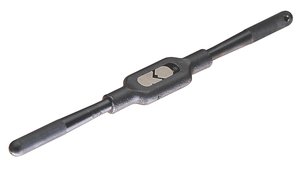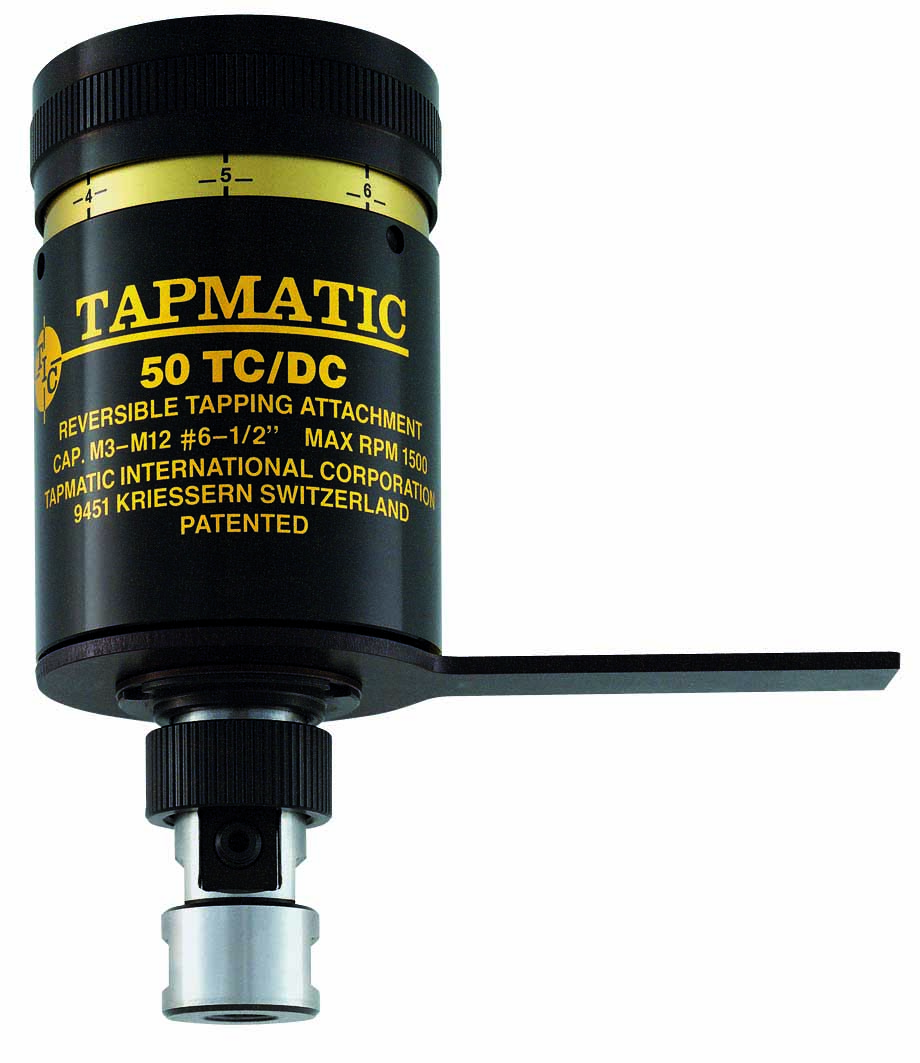Cool, got a link to the kit you pictured? Thanks!
Check this out, I'll probably buy once released. You'll be waiting a while though.
http://www.garagejournal.com/forum/showthread.php?t=336475
codrus wrote:Jumper K. Balls wrote: Invest in good tap handles as well. If the set you are thinking about buying has handles like these look elsewhereSo what is a good tap handle?
I have a few rules. if the tap is too small to have the centering divot in the back I use something like this

That General is a good tool for up to 10mm or 3/8" taps and has the centering divot

which is great when you need your threads at a perfect right angle to your piece. Couple that to a spring loaded centering tool and the lathe/mill/drill press becomes much more accurate than you can ever get by hand
Once you step up to 12mm or 1/2" and up I go with a large high quality one like this

I buy them second hand at swap meets and flea markets since they can easily run north of $100. A Starrett number 7 is over $200. Any tap over 10mm should have the centering divot. so a pass through is great.
Truth be told I have about a dozen tap wrenches in my tool box, but I tap a lot and in a lot of different sizes and pitches and in a lot of different situations with varying accessibility.
I use the Lisle tap holder sockets quite often

I use these cheapies off the Snap-on truck a lot too

I have a few of these that guide on flat surfaces or on dowels

Heck, I even own two tapmatic heads for my mill

My problem with the handles in my first post isn't the design. It is the low quality. They are included with every low to medium budget set and they are absolute garbage.
I have ruined days of fabrication work with one bad tap or handle. I have cost myself weeks of repair due to broken taps, dull taps that have seized into the piece or handles that deformed allowing the tap to bend and break. A good quality M8X1.25 tap is under a tenner, a nice handle can be had for $25. Spending a day or more to disassemble a car or motor to gain access to a broken tap to drill, EDM or whatever it out costs much more.
docwyte wrote: Cool, got a link to the kit you pictured? Thanks!
The craftsman and Lang kits look identical to the Snap-on and MAC ones I keep on hand for the guys in the shop
A tip for anyone who needs to run a tap into/thru a part freehand: Use a piece of steel at least as thick as the tap diameter an drill a hole thru it of the tap diameter. Hold this piece of metal to the face of the hole to help guide the tap in the first few threads to make sure everything is squared up nicely. And don't forget the cutting oil.
Thanks JKB for writing and linking pics to essentially what I would have said. I make threaded holes in things and threaded things that engage said holes, some of which are very, very expensive, as part of my day job. The assumption that one doesn't need "professional quality tools" because it's in a garage or under a car couldn't be wrongerer. Most of what I do is easily accessed, the part is in a vise or chuck, and the tap or die is normal to the surface of the work. Cleaning up a boogered thread in a diamond-hard welded boss on a rusty chassis you can barely reach is much harder. Chasing the remains of threads where a 200k mile exhaust stud was finally drilled out; possibly not even possible.
I have some really good taps from Emuge and Guhring for holes in exotic materials or which have to meet a specific thread class. But for the day-to-day work around the lab I have a few Hanson sets that are just fine. Bear in mind that a couple good taps cost as much as this whole set, so it's a bargain.
Also, I keep a little plastic 1/2 pint tub with some still-usable-but-not-by-me taps. 6x1, 8x1.25, 10x1.5, 8-32, 10-32, 1/4-20+28, 5/16-24, 3/8-24, 7/16-20, 1/2-20, which are all the sizes most open wheel + sports racers need. I loan these at the track.
Of critical importance is to use correct cutting fluids: Tap Magic on aluminum and sulphur based oil on steels.
When tapping advance to cut perhaps 1/2 a turn, then back to break the chip, then 1/2, and so on. Back the tap all the way out, brush off the chips, and if it's not a through hole, blow out the chips periodically (and this is the #1 way to get chips in your eye so be careful)
Jumper K. Balls wrote:codrus wrote:I have a few rules. if the tap is too small to have the centering divot in the back I use something like thisJumper K. Balls wrote: Invest in good tap handles as well. If the set you are thinking about buying has handles like these look elsewhereSo what is a good tap handle?That General is a good tool for up to 10mm or 3/8" taps and has the centering divot
which is great when you need your threads at a perfect right angle to your piece. Couple that to a spring loaded centering tool and the lathe/mill/drill press becomes much more accurate than you can ever get by hand
Once you step up to 12mm or 1/2" and up I go with a large high quality one like this
I buy them second hand at swap meets and flea markets since they can easily run north of $100. A Starrett number 7 is over $200. Any tap over 10mm should have the centering divot. so a pass through is great. Truth be told I have about a dozen tap wrenches in my tool box, but I tap a lot and in a lot of different sizes and pitches and in a lot of different situations with varying accessibility. I use the Lisle tap holder sockets quite often
I use these cheapies off the Snap-on truck a lot too
I have a few of these that guide on flat surfaces or on dowels
Heck, I even own two tapmatic heads for my mill
My problem with the handles in my first post isn't the design. It is the low quality. They are included with every low to medium budget set and they are absolute garbage. I have ruined days of fabrication work with one bad tap or handle. I have cost myself weeks of repair due to broken taps, dull taps that have seized into the piece or handles that deformed allowing the tap to bend and break. A good quality M8X1.25 tap is under a tenner, a nice handle can be had for $25. Spending a day or more to disassemble a car or motor to gain access to a broken tap to drill, EDM or whatever it out costs much more.
http://www.metricscrew-toolco.com/newspecial.html
If your not making new threads as others have said then use the above link, about 3/4 of the page down.
Jumper K. Balls said:I tap a lot of threads. I chase a lot of threads too. Around the shop I have a very complete snap-on set, an older craftsman set and a few Irwin sets. The snap-on sets are tough. They aren't particularly sharp though. They exist because I can let the other guys go caveman with them and when they damage them they are replaced every Thursday for free under warranty. The other sets are primarily still around because they are rarely used.
When I buy a new tap or die for myself I go to an industrial/machinist tool supplier and purchase HSS in singles. They aren't very expensive and I usually get the corresponding drill bit to go with them at the same time. I can tell a carbon steel tap from a high speed steel one from 6 feet away. You are looking for ground surfaces. If you can see rough areas from casting run away.
I would much rather have a handful of pro quality taps in the sizes I require than a complete set of lesser units with a bunch I will never use. Also spending $5-8 each time is easier to justify than $100 for a semi-decent set.
Invest in good tap handles as well. If the set you are thinking about buying has handles like these look elsewhere
I am getting the willies just hotlinking that pic!
Yes. My Craftsman is almost useless with those handles. You cannot run a tap through anything other than plastic without it slipping in the handle. This is regardless of how tight you have it. JUNK.
Back in December I needed a M8x1.25 tap and die to clean up some threads on a Miata. In desperation, I bought the 40 pc. carbon tap and die set from HF. There's nothing in that case that is worth spending $15 on. Maybe the nitride sets are better, but I was afraid that looking at the taps wrong would cause them to shatter.
I've had good luck with an older Craftsman SAE set. As the commonly used taps wear out or I've needed a different tap (e.g., bottoming), I've order individual taps from McMaster Carr.
i started with a Craftsmen tap set, metric type. I later got a US-SAE tap set. I have added to the sets over the years and now find that I can tap most any size thread the is commonly used in an automotive app. Friends come to me when they get into a bind.
As for cutting threads in a hole the most common mistake I see is just trying to screw the tap into the hole. This will bind up the tap and most likely snap it off in the hole. If you're lucky you have enough of the tap left to turn it out, sometimes you don't. That sucks.
I never turn a tap more then a 1/2 turn without backing the tap out until it breaks off the chips that form on the cutting edges of the tap. These chips, if not broken off, are what cause a tap to jam in a hole.
You'll need to log in to post.